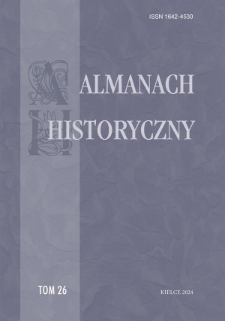Biblioteka Cyfrowa Uniwersytetu Jana Kochanowskiego udostępnia 13 367 obiektów cyfrowych
Obiekt
Tytuł: The Action of Taking over Former German Factoriesand Assets of the Tobacco Industry in the Upper Silesia Regionafter World War II*
Twórca:
Tytuł publikacji grupowej:
Współtwórca:
Abstrakt:
The article presents the complex circumstances surrounding the takeover of former German factories and assets of the tobacco industry by the Polish Tobacco Monopoly. This issue has not yet received any comprehensive treatment in historiography. After the end of World War II, most of the PMT (Polish Tobacco Monopoly) facilities were not in the best condition; a significant portion of machinery and equipment was destroyed, and there was also a shortage of tobacco raw material. Much of the monopoly’s assets were taken by the Germans, and unfortunately, after the war, it was often impossible to determine where they ended up. In 1945, the practice of taking over and exporting Polish property was continued by the Russians. Although the number of locations where PMT secured German property may seem significant, in most cases, the acquired machinery and equipment were heavily worn out, and their usefulness in current production gradually declined. However, it is difficult to unequivocally answer whether the German factories and machinery secured by PMT after the war offset the wartime losses of the Polish tobacco industry. The acquisition of the “Aviatic” cigarette factory in Wrocław was of particular importance, especially since there was already a forecasted increase in the population’s demand for cigarettes before the war. On the other hand, the acquired equipment from numerous, mostly small, tobacco plants scattered across the Recovered Territories did not represent significant added value for the emerging Polish tobacco industry rising from the ruins.
Spis treści:
Spis treści
Artykuły
11 Agnieszka Bartnik (Uniwersytet Śląski w Katowicach), Iconography and the Breeding of the So-called Melitaeus catulus in Ancient Greece and Rome. A Few Comments in Passing
33 Marta Cichocka (Uniwersytet Szczeciński), “The Unresolvable Question”. The Jews in Aleksander Świętochowski’s Journalism
67 Józef Kałużny (Uniwersytet Papieski Jana Pawła II w Krakowie), Kolekcja dwudziestu czterech matryc drukarskich należących do św. Józefa Bilczewskiego odnaleziona w krakowskim archiwum – znaczenie i problematyka badawcza
95 Szymon Kazusek (Uniwersytet Jana Kochanowskiego w Kielcach), Historical Water Levels of the Nogat River and Wind Resources in Malbork in the Years 1811–1828 as an Element of the Conditions of Inland Navigation
135 Radosław Kubus (Uniwersytet Gdański), Recommendations for the use of Phlebotomy in the Light of Johann Christian Ackermann’s Treatise Entitled Abhandlung von den Krankheiten der Künstler und Handwerker (1780–1783)
151 Andrzej K. Kuropatnicki (Uniwersytet Komisji Edukacji Narodowej w Krakowie), The Early Culinary Manuscripts in the National Library of Ireland 175 Ołeh Żurba (Dnieprowski Uniwersytet Narodowy im. Ołesia Honczara), Archiwalia dotyczące uczestników powstania styczniowego w zbiorach Archiwum Państwowego Obwodu Dniepropietrowskiego
189 Anita Młynarczyk-Tomczyk (Uniwersytet Jana Kochanowskiego w Kielcach), Cenzura prewencyjna wobec prasy w latach 1949–1956. Casus „Słowa Ludu” – organu Komitetu Wojewódzkiego PZPR w Kielcach
237 Paweł Sekuła (Uniwersytet Jagielloński w Krakowie), Mitigating the Effects of the Chernobyl Disaster in the Light of the Archival Documents And Eyewitnesses’ Accounts
263 Andrzej Synowiec (Uniwersytet Jagielloński w Krakowie), The Action of Taking over Former German Factories and Assets of the Tobacco Industry in the Upper Silesia Region after World War II
291 Hubert Wilk (Instytut Historii im. Tadeusza Manteuffla Polskiej Akademii Nauk), Starzy, chorzy i zagubieni. Problemy i postawy ludzi starych na przykładzie „partyjnych emerytów” w optyce źródeł szczebla Podstawowej Organizacji Partyjnej drugiej połowy lat osiemdziesiątych na przykładzie Skarżyska-Kamiennej
305 Paweł Wolańczyk (Muzeum Historii Kielc), Odrodzenie się samorządu miejskiego w Kielcach (kwiecień 1990 – styczeń 1991) Materiały źródłowe
333 Kamil Szpunar (Muzeum Wsi Radomskiej w Radomiu), Osiemnastowieczne inwentarze pośmiertne ruchomości szlachty małopolskiej na przykładzie rodziny Dembińskich herbu Rawicz Artykuły recenzyjne i recenzje
363 Przemysław P. Szpaczyński (badacz niezależny, Zielona Góra) Monarchia mixta, czyli spór o decydenta. Kilka uwag na temat koncepcji władzy w Polsce w latach 1505–1607
401 Helena Avelar de Carvalho, An Astrologer at Work in Late Medieval France. The Notebooks of S. Belle, Leiden: Brill 2021 (Time, Astronomy, and Calendars, vol. 11), XII + 423 ss.; ISBN: 978-90-04-46337-0 – Sylwia Konarska-Zimnicka (Uniwersytet Jana Kochanowskiego w Kielcach)
405 Zasady przyjmowania tekstów do druku i procedury recenzowania obowiązujące w „Almanachu Historycznym”
Miejsce wydania:
Opis fizyczny:
ISSN:
Wydawca:
Wydawnictwo Uniwersytetu Jana Kochanowskiego w Kielcach
Data wydania:
Identyfikator:
oai:bibliotekacyfrowa.ujk.edu.pl:12720 doi:10.25951/13176
Język:
Jest częścią:
Ma część:
Typ:
Prawa dostępu:
Format:
Kolekcje, do których przypisany jest obiekt:
- Biblioteka Cyfrowa Uniwersytetu Jana Kochanowskiego > Wydawnictwo Uniwersyteckie
- Biblioteka Cyfrowa Uniwersytetu Jana Kochanowskiego > Wydawnictwo Uniwersyteckie > Wydawnictwa ciągłe
- Biblioteka Cyfrowa Uniwersytetu Jana Kochanowskiego > Wydawnictwo Uniwersyteckie > Wydawnictwa ciągłe > „Almanach Historyczny”
Data ostatniej modyfikacji:
4 kwi 2025
Data dodania obiektu:
4 kwi 2025
Liczba wyświetleń treści obiektu:
113
Wszystkie dostępne wersje tego obiektu:
https://bibliotekacyfrowa.ujk.edu.pl/publication/13176

